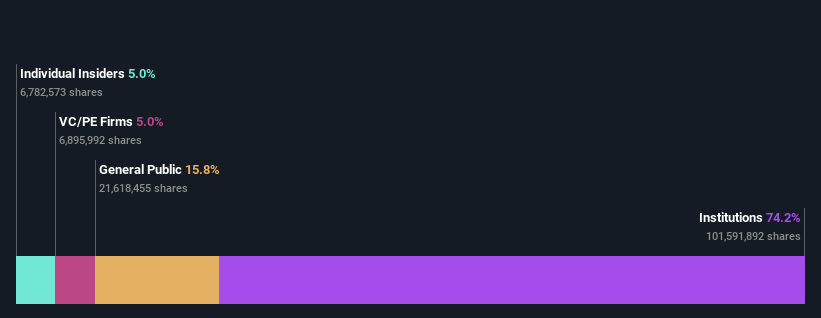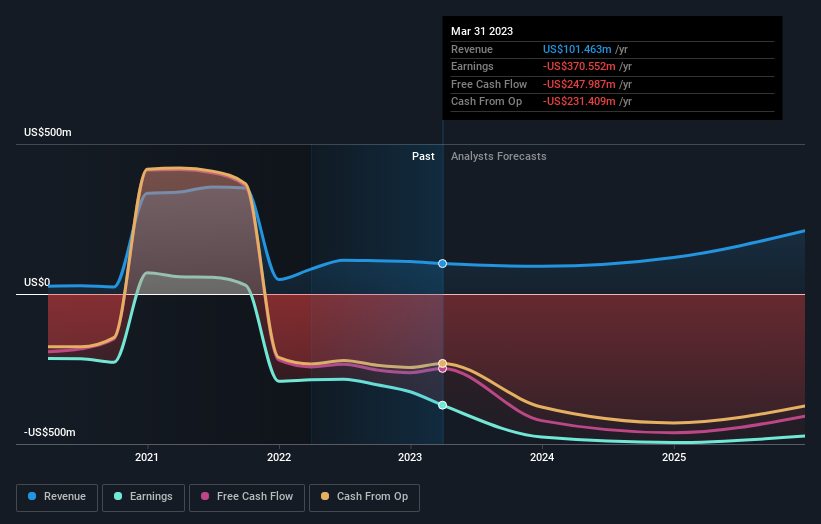In the wake of Denali Therapeutics Inc.'s (NASDAQ:DNLI) latest US$402m market cap drop, institutional owners may be forced to take severe actions
Key Insights
Given the large stake in the stock by institutions, Denali Therapeutics' stock price might be vulnerable to their trading decisions
A total of 11 investors have a majority stake in the company with 51% ownership
Using data from analyst forecasts alongside ownership research, one can better assess the future performance of a company
If you want to know who really controls Denali Therapeutics Inc. (NASDAQ:DNLI), then you'll have to look at the makeup of its share registry. With 74% stake, institutions possess the maximum shares in the company. In other words, the group stands to gain the most (or lose the most) from their investment into the company.
As a result, institutional investors endured the highest losses last week after market cap fell by US$402m. Needless to say, the recent loss which further adds to the one-year loss to shareholders of 2.2% might not go down well especially with this category of shareholders. Often called “market makers”, institutions wield significant power in influencing the price dynamics of any stock. Hence, if weakness in Denali Therapeutics' share price continues, institutional investors may feel compelled to sell the stock, which might not be ideal for individual investors.
Let's take a closer look to see what the different types of shareholders can tell us about Denali Therapeutics.
View our latest analysis for Denali Therapeutics
What Does The Institutional Ownership Tell Us About Denali Therapeutics?
Many institutions measure their performance against an index that approximates the local market. So they usually pay more attention to companies that are included in major indices.
As you can see, institutional investors have a fair amount of stake in Denali Therapeutics. This suggests some credibility amongst professional investors. But we can't rely on that fact alone since institutions make bad investments sometimes, just like everyone does. When multiple institutions own a stock, there's always a risk that they are in a 'crowded trade'. When such a trade goes wrong, multiple parties may compete to sell stock fast. This risk is higher in a company without a history of growth. You can see Denali Therapeutics' historic earnings and revenue below, but keep in mind there's always more to the story.
Since institutional investors own more than half the issued stock, the board will likely have to pay attention to their preferences. Denali Therapeutics is not owned by hedge funds. Looking at our data, we can see that the largest shareholder is Baillie Gifford & Co. with 11% of shares outstanding. In comparison, the second and third largest shareholders hold about 7.4% and 6.9% of the stock. Additionally, the company's CEO Ryan Watts directly holds 1.6% of the total shares outstanding.
A closer look at our ownership figures suggests that the top 11 shareholders have a combined ownership of 51% implying that no single shareholder has a majority.
Researching institutional ownership is a good way to gauge and filter a stock's expected performance. The same can be achieved by studying analyst sentiments. There are plenty of analysts covering the stock, so it might be worth seeing what they are forecasting, too.
Insider Ownership Of Denali Therapeutics
The definition of an insider can differ slightly between different countries, but members of the board of directors always count. Company management run the business, but the CEO will answer to the board, even if he or she is a member of it.
Insider ownership is positive when it signals leadership are thinking like the true owners of the company. However, high insider ownership can also give immense power to a small group within the company. This can be negative in some circumstances.
Our most recent data indicates that insiders own some shares in Denali Therapeutics Inc.. It is a pretty big company, so it is generally a positive to see some potentially meaningful alignment. In this case, they own around US$194m worth of shares (at current prices). It is good to see this level of investment by insiders. You can check here to see if those insiders have been buying recently.
General Public Ownership
With a 16% ownership, the general public, mostly comprising of individual investors, have some degree of sway over Denali Therapeutics. This size of ownership, while considerable, may not be enough to change company policy if the decision is not in sync with other large shareholders.
Private Equity Ownership
With a stake of 5.0%, private equity firms could influence the Denali Therapeutics board. Sometimes we see private equity stick around for the long term, but generally speaking they have a shorter investment horizon and -- as the name suggests -- don't invest in public companies much. After some time they may look to sell and redeploy capital elsewhere.
Next Steps:
While it is well worth considering the different groups that own a company, there are other factors that are even more important. For instance, we've identified 2 warning signs for Denali Therapeutics that you should be aware of.
But ultimately it is the future, not the past, that will determine how well the owners of this business will do. Therefore we think it advisable to take a look at this free report showing whether analysts are predicting a brighter future.
NB: Figures in this article are calculated using data from the last twelve months, which refer to the 12-month period ending on the last date of the month the financial statement is dated. This may not be consistent with full year annual report figures.
Have feedback on this article? Concerned about the content? Get in touch with us directly. Alternatively, email editorial-team (at) simplywallst.com.
This article by Simply Wall St is general in nature. We provide commentary based on historical data and analyst forecasts only using an unbiased methodology and our articles are not intended to be financial advice. It does not constitute a recommendation to buy or sell any stock, and does not take account of your objectives, or your financial situation. We aim to bring you long-term focused analysis driven by fundamental data. Note that our analysis may not factor in the latest price-sensitive company announcements or qualitative material. Simply Wall St has no position in any stocks mentioned.
Join A Paid User Research Session
You’ll receive a US$30 Amazon Gift card for 1 hour of your time while helping us build better investing tools for the individual investors like yourself. Sign up here


